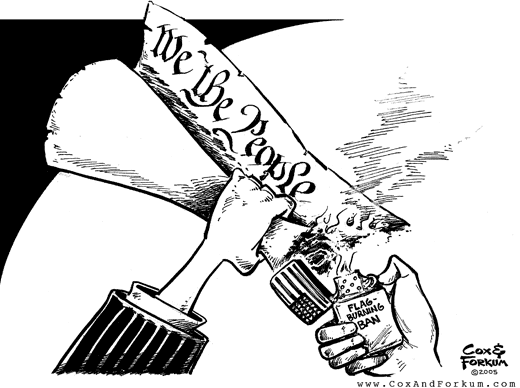
The poem, “The Flag Goes By,” written in 1900 by Henry Holcomb Bennett (1863-1924), brims with love of country and national loyalty:
Hats off!
Along the street there comes
A blare of bugles, a ruffle of drums,
A flash of color beneath the sky:
Hats off!
The flag is passing by!
Bennett’s poem also speaks of a flag carried into war, carrying thoughts of remembrance:
But more than the flag is passing by:
Sea fights and land fights, grim and great,
Fought to make and to save the State;
Weary marches and sinking ships;
Cheers of victory on dying lips.
On this latter point especially, on war — from World War I through Vietnam and Operation Iraqi Freedom — not all agree to a “Hats off.” Some see all wars, or a particular war, as nationalism run amok.
Gregory Lee Johnson, for instance, publicly unfurled an American flag, soaked it with kerosene and set it on fire in front of Dallas City Hall in 1984 while the Republicans were in town for their national convention, the one that re-nominated Ronald Reagan.
Johnson, along with about 100 other demonstrators, was protesting the policies of the Reagan administration. A “die-in” by the protestors sought to bring attention to the dangers of nuclear war.
Under Texas law, Johnson was convicted of desecrating a flag and sentenced to one year in prison and fined $2,000.
Five years later in a 5-4 decision, the Supreme Court, in Texas v. Johnson, held that flag burning as a means of political protest is protected by the First Amendment’s guarantee of free speech.
At his Texas trial, Johnson contended that the flag was burned as “symbolic speech.” The Supreme Court agreed with Johnson’s expansive definition of “speech.”
“The First Amendment literally forbids the abridgment only of speech, but we have long recognized that its protection does not end at the spoken or written word,” states the majority opinion of the court, written by Justice William J. Brennan. “Especially pertinent to this case are our decisions recognizing the communicative nature of conduct relating to flags.”
Drawing on past decisions in which the court had rejected government efforts to curb the expression of unpopular opinions, Brennan explained that the court has “not permitted the government to assume that every expression of a provocative idea will incite a riot, but have instead required a careful consideration of the actual circumstances surrounding such expression, asking whether the expression is directed to inciting or producing imminent lawless action and is likely to incite or produce such action.'”
In Johnson’s case, “no one was physically injured or threatened with injury,” wrote Brennan, “though several witnesses testified that they had been seriously offended by the flag burning.”
Noting that “federal law designates burning as the preferred means of disposing of a flag,” and that Johnson wouldn’t have been convicted of flag desecration under Texas law “if he had burned the flag as a means of disposing of it because it was dirty or torn,” the court held that the Texas law was designed to protect the flag “only against impairments that would cause serious offense to others.”
In short, it’s the reason behind the flag burning that’s the issue. In Johnson’s case, the court said, he “was not prosecuted for the expression of just any idea; he was prosecuted for his expression of dissatisfaction with the policies of this country, expression situated at the core of our First Amendment values.”
Further, the court did not support the conviction because “Johnson’s conduct did not threaten to disturb the peace,” wrote Brennan. “Nor does the State’s interest in preserving the flag as a symbol of nationhood and national unity justify his criminal conviction for engaging in political expression.”
And the status of the flag? “We are tempted to say, in fact, that the flag’s deservedly cherished place in our community will be strengthened, not weaken, by our holding today,” Brennan maintained. “Our decision is a reaffirmation of the principle of freedom and inclusiveness that the flag best reflects, and of the conviction that our tolerance of criticism such as Johnson’s is a sign and source of our strength.”
To punish flag burning, Brennan concluded, is a contradiction, a violation of what the flag stands for: “We do not consecrate the flag by punishing its desecration, for in doing so we dilute the freedom that this cherished emblem represents.”




